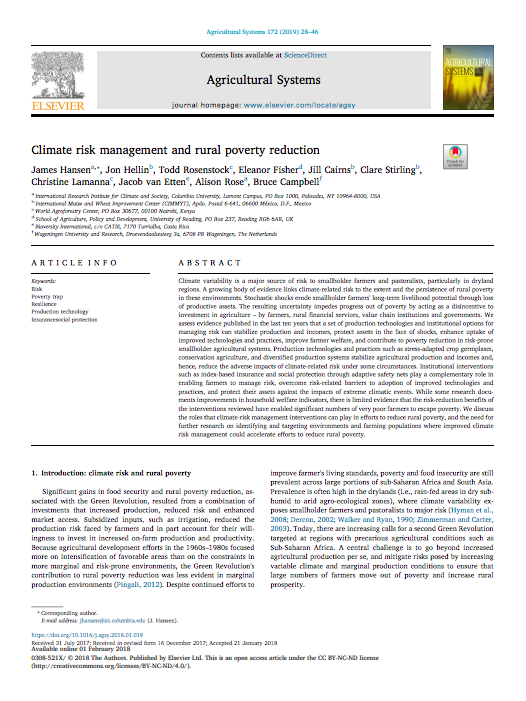Climate risk management and rural poverty reduction

ABSTRACT
Climate variability is a major source of risk to smallholder farmers and pastoralists, particularly in dryland regions. A growing body of evidence links climate-related risk to the extent and the persistence of rural poverty in these environments. Stochastic shocks erode smallholder farmers’ long-term livelihood potential through loss of productive assets. The resulting uncertainty impedes progress out of poverty by acting as a disincentive to investment in agriculture – by farmers, rural financial services, value chain institutions and governments.
We assess evidence published in the last ten years that a set of production technologies and institutional options for managing risk can stabilize production and incomes, protect assets in the face of shocks, enhance uptake of improved technologies and practices, improve farmer welfare, and contribute to poverty reduction in risk-prone smallholder agricultural systems. Production technologies and practices such as stress-adapted crop germplasm, conservation agriculture, and diversified production systems stabilize agricultural production and incomes and, hence, reduce the adverse impacts of climate-related risk under some circumstances.
Institutional interventions such as index-based insurance and social protection through adaptive safety nets play a complementary role in enabling farmers to manage risk, overcome risk-related barriers to adoption of improved technologies and practices, and protect their assets against the impacts of extreme climatic events. While some research documents improvements in household welfare indicators, there is limited evidence that the risk-reduction benefits of the interventions reviewed have enabled significant numbers of very poor farmers to escape poverty. We discuss the roles that climate-risk management interventions can play in efforts to reduce rural poverty, and the need for further research on identifying and targeting environments and farming populations where improved climate risk management could accelerate efforts to reduce rural poverty.